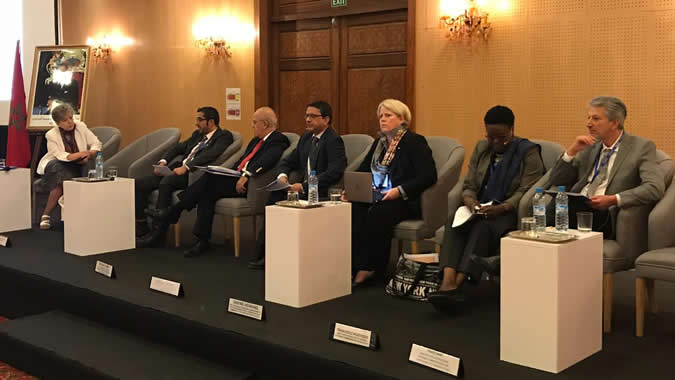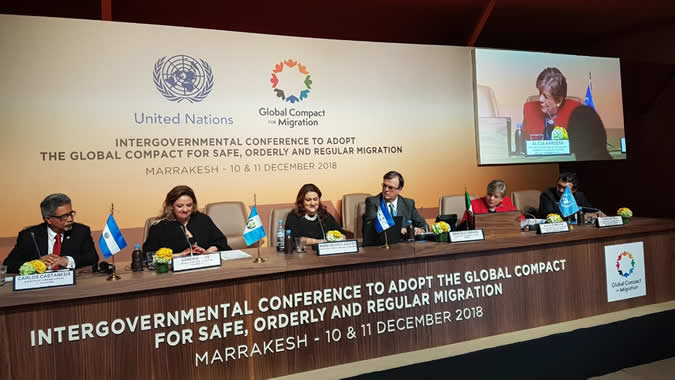Understanding and Addressing Regional Dimensions is Crucial for Guaranteeing Safe, Orderly and Regular Migration
Work area(s)
Alicia Bárcena, ECLAC’s Executive Secretary, participated today in the Intergovernmental Conference on the Global Compact for Migration, being held in Marrakech.

International migration is a global phenomenon, however, the majority of movements take place within regions and, in each region, there are different opportunities and limitations. For that reason, understanding and addressing the regional dimensions of this phenomenon is crucial for guaranteeing safe, orderly and regular migration, Alicia Bárcena, Executive Secretary of the Economic Commission for Latin America and the Caribbean (ECLAC), affirmed today.
In the framework of her participation in the Intergovernmental Conference on the Global Compact for Migration, which is being held through Tuesday, December 11 in Marrakech, ECLAC’s most senior representative participated in Dialogue 1 of the summit, which addressed the promotion of action on the commitments of the Global Compact for Safe, Orderly and Regular Migration.
In her remarks, on behalf of the five United Nations regional economic commissions, Alicia Bárcena recalled that, although large migratory movements can incur substantial adjustment costs, they also have an overwhelmingly positive social, economic and cultural impact in countries of origin and destination, and they represent an empowering experience for millions of migrants and their families.
She stressed that the benefits of migration for economic growth are undeniable: “In 2015, migrants’ contribution to global GDP was approximately $6.7 billion dollars, equivalent to 9.4% of global GDP.”
ECLAC’s Executive Secretary added that the Global Compact, adopted today in Marrakech, recognizes the importance of the regional dimension of international migration, as well as the need to intensify regional cooperation.
It has been proven that the synergies between different institutional spaces – such as consultation processes, agreements on economic and political integration and intergovernmental forums, where countries can dialogue and share experiences – are more feasible at a regional level, she sustained.
In this sense, she indicated that the UN regional economic commissions can contribute to implementation of the Global Compact and its regional processes for follow-up and monitoring through the empirical analysis of trends in regional migration, in order to understand its root causes, compile and produce data, provide methodologies to improve comparability and break the statistical silence.
They can also provide, in collaboration with the International Organization for Migration (IOM), platforms for regional review and establish dialogues between governments, the private sector, civil society and other stakeholders.
ECLAC’s top representative added that the regional commissions can also produce evidence-based policy analysis to understand the root causes of human mobility and to establish critical links between demography, migration, productive structures, trade and labor market opportunities in the respective regions and subregions.
Another contribution lies in evaluating the abilities needed for migrants and receiving communities to improve educational programs and ensure absorption of technological progress, as well as linking the implementation of the Global Compact with South-South Cooperation, including improvements in the portability of rights, social security and educational degrees, among others.
“The five regional commissions view the Global Compact as a historic opportunity to recognize the triad of rights, development and migration, as part of the future of nations,” Alicia Bárcena concluded.
Related content

Pacto Mundial para la Migración otorga un marco de principios comunes no vinculantes para afrontar un tema transfronterizo por naturaleza: Alicia Bárcena
At the start of her participation in the Intergovernmental Conference for Migration that is being held in Marrakech, Morocco, ECLAC’s Executive Secretary addressed the global agreement’s relevance…

Foreign Ministers of El Salvador, Guatemala, Honduras and Mexico Presented Comprehensive Development Plan in the Framework of the Conference on the Global Compact for Migration
The regional initiative will change the paradigm of migration, development and cooperation between northern Central America and Mexico, under ECLAC’s auspices.

Latin America and the Caribbean vis-à-vis the Global Compact for Safe, Orderly and Regular Migration
Op-ed by Alicia Bárcena, Executive Secretary of ECLAC.
Type
Country(ies)
- Latin America and the Caribbean